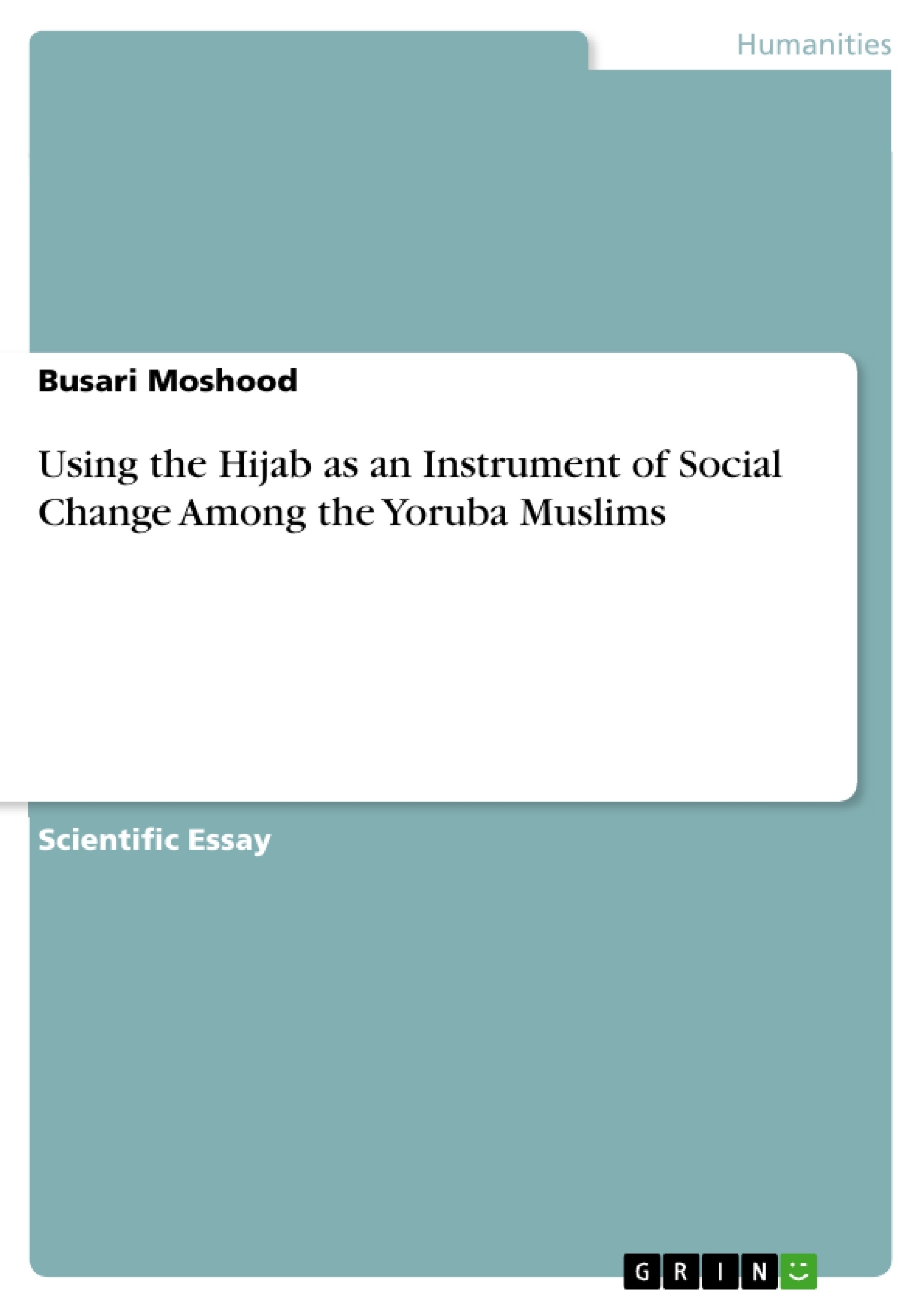The concept of change has, of recent, become a mantra echoed in all areas of life in this part of the world. The reason for this development could be hinged on the emphasis laid on different aspects of change by various theoretical schools like that of Marxist. Thus, as a social change evolves from a number of different sources, this paper aims at examining the Hijāb as an instrument of change among the Yoruba Muslims. This will take into accounts, various controversies that trail the use of Hijāb in the Muslims folk and pragmatically unveil its inherent values which could be explored to enthrone a change in the social system of especially the Yoruba Muslims.
Purposive sampling technique will be used in selecting twenty-five (25) Muslims-scholars and non- scholars for interviews, from eight notable Muslim organizations of Zumrah al-Mu’minīn, Izālatul-Bid‘ah wa Iqāmatus-Sunnah, Tablīgh Brotherhood, Muslim Students’ Society of Nigeria (MSSN), The Muslim Congress (TMC), Ta‘āwun al-Muslimīn, Tijāniyyah and Qādiriyyah Sufi Orders, on some social related issues on the Hijāb. The data will be analyzed quantitatively using the Qur’ān and Hadith. In this respect, the relationship between the Hijāb and virtues such as humility, trustworthiness, chastity and bashfulness among other social values will be critically juxtaposed vis á vis the Hijāb as an Islamic emblem and its inmates as agents of social change in the context of this paper.
The concluding part of the study will discuss the findings of the research with the aim of addressing the difference between the reality of the divine injunctions governing the use of Hijāb and any conceived deviation and disparity in the practical utilization of the Hijab by female Muslims, which may hitherto result in a generalized negative impression on the Hijāb itself and its users. This analysis will be used as a premise for establishing the instrumentality of the Hijāb in the crusade of a social change in Yorubaland in general and among the Yoruba Muslims in particular.
Table of Contents
- Abstract
- Introduction
- Definition of Hijāb
- Historical Evolution of Hijāb
- The Hijab and Controversies among Yoruba Muslims
- Hijāb as an Instrument of Social Change
- Conclusion
- Recommendations
- Notes and References
Objectives and Key Themes
This paper aims to explore the Hijāb as an instrument of social change among Yoruba Muslims in Nigeria. The study examines the controversies surrounding the use of the Hijāb and its inherent values, highlighting its potential to influence social systems.
- The historical evolution of the Hijāb and its diverse interpretations
- The controversies surrounding the Hijāb among Yoruba Muslims
- The potential of the Hijāb as an instrument of social change
- The relationship between the Hijāb and social values like humility, trustworthiness, and chastity
- The impact of the Hijāb on the social system of Yoruba Muslims
Chapter Summaries
- Introduction: This chapter introduces the concept of the Hijāb and its significance in the context of Yoruba Muslims. It clarifies the scope of the study and emphasizes the importance of understanding the Hijāb's meaning, origin, and types.
- Definition of Hijāb: This chapter explores the various definitions of the Hijāb, both from a physical and metaphysical perspective. It analyzes different interpretations of the Hijāb, including its association with modesty, privacy, and morality.
- Historical Evolution of Hijāb: This chapter delves into the historical evolution of the Hijāb, tracing its origins and development. It examines the role of cultural influences and societal norms in shaping the practice of veiling, particularly in the context of early Islam and subsequent periods.
- The Hijab and Controversies among Yoruba Muslims: This chapter examines the controversies surrounding the use of the Hijāb among Yoruba Muslims. It explores the various arguments and perspectives on the impact of the Hijāb on society, its symbolism, and the personality of the Hijāb user.
Keywords
The primary keywords and focus topics of this work include Hijāb, social change, instrument, Yoruba Muslims, Islamic emblem, social values, humility, trustworthiness, chastity, bashfulness, and divine injunctions.
Frequently Asked Questions
What is the main objective of this paper regarding the Hijab?
The paper explores the Hijab as an instrument of social change among Yoruba Muslims, highlighting its potential to influence values and social systems.
Which specific group of Muslims is the focus of this study?
The study focuses on Yoruba Muslims in Nigeria, selecting participants from various notable Muslim organizations like MSSN, TMC, and Sufi orders.
How is the Hijab linked to social values in this research?
The research juxtaposes the Hijab with virtues such as humility, trustworthiness, chastity, and bashfulness.
What controversies surround the Hijab among Yoruba Muslims?
The paper examines arguments regarding its impact on society, its symbolism, and perceived deviations from divine injunctions.
How is the data analyzed in this study?
The data is analyzed quantitatively and qualitatively using the Qur’an and Hadith as primary frameworks.
- Quote paper
- Busari Moshood (Author), 2017, Using the Hijab as an Instrument of Social Change Among the Yoruba Muslims, Munich, GRIN Verlag, https://www.grin.com/document/352192



